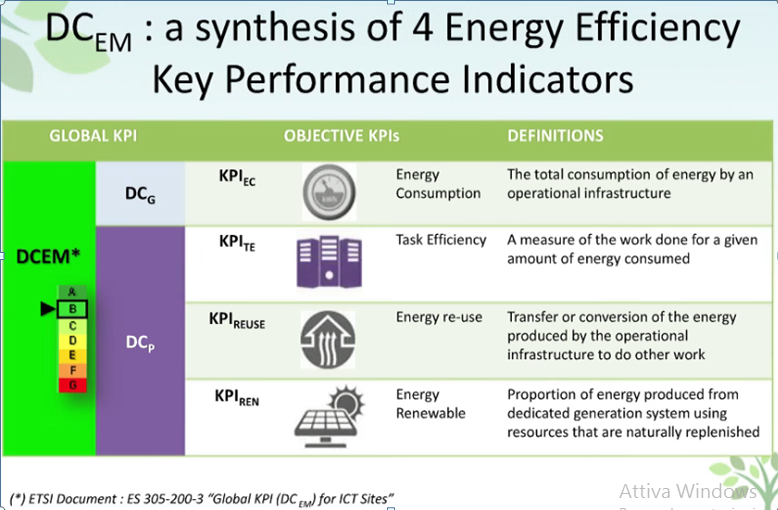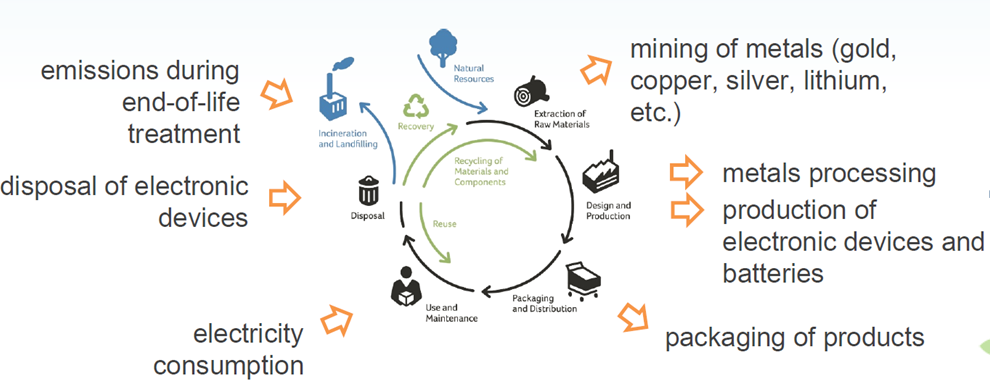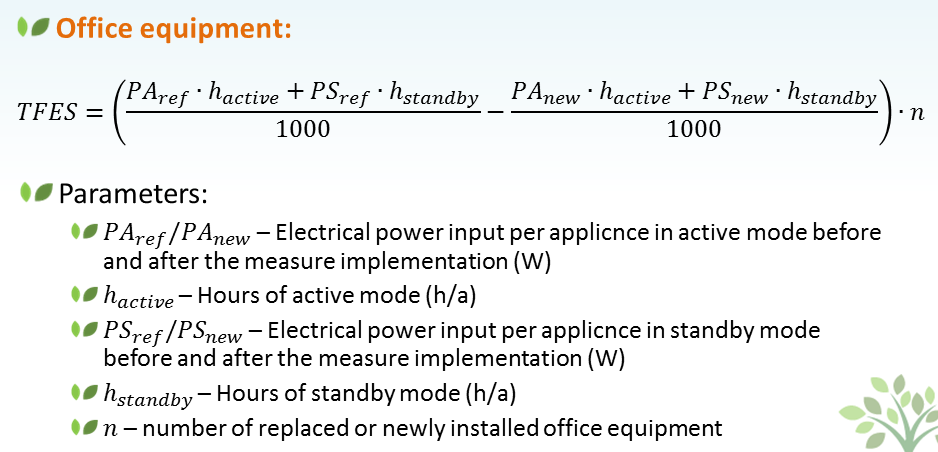
Solutions for Energy Management & Life Cycle Assessment (LCA) in ICT field
Gathering greater momentum in its webinar series, the H2020 CSA project ICTFOOTPRINT.eu proudly hosted its 5th webinar edition zooming in on global experts providing insights to different solutions for energy management and LCA and how to manage the energy consumed by ICT.
Renowned speakers delivered their take including: Jean-Marc Alberola, Group Energy Strategy leader at Airbus & Vice Chairman of ETSI ISG OEU discussing the work developed by the organisation’s, operative KPIs enabling energy management performance in data centres and ICT sites to be monitored to Fadri Casty (Head of Sales & Business Development) & Tereza Lévová (Project Manager & Environmental Engineer), both from EcoInvent, demonstrating the value of performing LCA on ICT equipment as an ICT sustainability measure.
Moreover, Berina Delalic, from the H2020 multEE project, introduced the Monitoring & Verification Platform (MVP), a web-based tool developed to calculate and store data on energy and CO2 savings resulting from implemented energy efficiency measures. Silvana Muscella, CEO of Trust-IT Services and Project Coordinator of ICTFOOTPRINT.eu, moderated the webinar.
A single KPI towards sustainable and energy efficient Data Centres
Data centres have acquired a crucial role in the sustainability of the ICT sector. Alone, they consume 3% of the global electricity supply and account for 2% of total greenhouse gas emissions (GHG). This gives them an equivalent carbon footprint to the airline industry (Source). The European Union (EU) have defined a Policy Framework to address this, focused on decreasing GHG emissions & energy consumption by 20% by 2020 (compared to levels from 1990). Bearing this in mind, the ETSI-developed standards listed in the ICTFOOTPRINT.eu Map of ICT Standards, will help users to improve energy usage and increase the efficiency of data centres.
Jean-Marc Alberola introduced 1 of these standards, ETSI 205-200, which can be applied by organisations & projects, with a high potential for application in Smart Cities. It provides a global KPI, known as Data Centre Energy Management (DCEM) to monitor the energy management performance of data centres, in data treatment and data transmission. It also provides insight on the other operational infrastructures of ICT sites, namely fixed & mobile access networks.
DCEM is a synthesis of 4 global, energy-efficient KPI indicators, known as “Objective KPIs”. Each one, defined under a certain timeframe and operating conditions, indicates requirements for the measurement of specific energy management topics operation and infrastructure, which can be controlled by the operator. These KPIs, are influenced by the “Technical KPIs” that are used to assess the performance of the subcomponents’ design and implementation phases, crucial to enable energy consumption savings when the equipment is operating.

A success story, also available on the ICTFOOTPRINT.eu website about the implementation of ETSI 205-200 was presented by Airbus, which has deployed DCEM in its datacentres throughout Europe, helping the company’s infrastructure management team to monitor the operational capacity of the centres in terms of power and cooling. This has enabled the identification of performance deviations and verification of the efficiency of the “sustainable” ICT actions implemented. Other Success Stories on sustainable data centres can be found on the ICTFOOTPRINT.eu website: https://ictfootprint.eu/en/success-stories
On asked what strategy data centres should follow to become more efficient in their energy consumption, Jean-Marc replied that making space for new equipment in the existing infrastructure is crucial.
“With the deployment of digitalisation, there is more need in terms of implementation of equipment for ICT. We shall remove all unnecessary equipment, making more space in the data room. This shall be followed by a “Technology Urbanisation”, a disaggregation, in order to have a better room layout, which will increase the flow of air and allow better cooling and monitoring of data centres. This way, we can implement tools which will monitor the data centres energy efficiency”.
The strategy shall take the environmental targets of the organisation into account, the owner of the data centre, and also future environmental policies.
The ETSI 205-200 factsheet is available for download on ICTFOOTPRINT.eu: https://ictfootprint.eu/etsi-205-200-factsheet
Life Cycle Assessment – A holistic overview of the sustainability of ICT products
Becoming sustainable in ICT requires consideration of the Life Cycle Assessment (LCA) of all ICT components. As indicated by Fadri Casty and stated in the online helpdesk of the ICTFOOTPRINT.eu knowledge base, LCAs take a spectrum of resource flows and environmental interventions associated with a product, service or organization, from a supply chain perspective, including all phases from raw material acquisition through processing, distribution, use, and end-of-life processes. It’s crucial to have accurate data on all stages of the LCA, as each one has different environmental impact. This enables organisations to make truly informed decisions about the sustainability of ICT products.
“The biggest ICT companies in the market, like Apple and Samsung, pay attention to this topic and contacted ecoinvent for support to become more ICT sustainable”, Fadri highlighted.
ecoinvent supports organisations in identifying the carbon footprint of products, namely those from ICT. Ecoinvent is the largest Life Cycle Inventory (LCI) database, providing valuable information on GHG, carbon footprint and the overall environmental footprint of the product. Their datasets allow organisations to perform an accurate LCA of the whole ICT product and material value chain. For example, ICT managers can discover the environmental impact of mining metals (e.g. gold, silver, lithium) and the respective process when producing electronic devices and batteries, allowing them to search more sustainable materials. Along with the energy consumed when users are using devices, the packaging of the device, as well as the procedures related to its disposal, contribute to the overall carbon footprint of the product.

“This data helps ICT to analyse the environmental impact of products in all stages of the supply chain”, states Tereza Lévová. “Our sustainable data is collected thanks to partnerships with universities or international associations (e.g. Aluminium producers), which provide us with scientific, impartial data. We also work with organisations, interested in gathering data on a specific LCA topic, to fund projects whose goal is to provide answers. Having the most updated data is always a challenge”.
Data reliability is an important factor when performing accurate ICT LCA.
“Deloitte Sustainability and Trust-IT Services are in the process of finalising an ICTFOOTPRINT.eu Self-Assessment Tool, where users can assess the carbon footprint of an ICT service or organisation. As the ICT sector is rapidly evolving, an important concern we have is to implement the tool with the most accurate and reliable data”, states Silvana Muscella.
According to Tereza, organisations should firstly identify the most relevant LCA phase and its overall environmental impact. In some cases, the Achilles heel is “use & maintenance”, while in others it’s “design & production”. Knowing this, organisations should have a direction and find the most updated data available ecoinvent ensures users have access to this.
Towards sustainable ICT policy planning – The Monitoring and Verification Platform
Regarding Europe’s energy efficiency (EE), it is important that public authorities start implementing policy planning on topic. One reason for the lack of policies is having inadequate energy statistics for monitoring purposes and the existence of poorly designed monitoring and verification (M&V) schemes. multEE is a Horizon 2020 project, funded under the European Commission Framework Programme that aims to improve the consistency and quality of energy efficiency policy planning, implementation and monitoring between different administrative levels, namely through M&V schemes.
Working towards this goal, multEE developed the “Monitoring and Verification Platform” (MVP), a web application that assists in measuring progress towards EE national, regional or even municipal targets. This app indicates the expected energy consumption and CO2 emissions savings, by comparing the levels before and after the implementation of plans. The analysis bases itself on the collection of bottom-up data on a number of plans and measures to support public administrators in developing future EE plans and targets. MVP, to be used by Member States to elaborate their NEEAP (National Energy Efficiency Action Plan), has a very simple interface, making it easy for users to insert data and identify energy savings from actions implemented.
MVP can support ICT in its sustainability quest, by providing EE measures on improving cooling systems and installing & replacing office equipment that’s more sustainable. In this regard MVP considers electrical power input per appliance in active and standby modes and the number of hours that the equipment is in both modes.

MVP is available for testing at the following link, which also includes a training manual presenting the main functionalities: http://multee.eu/how-innovative-web-applications-can-support-energy-efficiency-policy-planning
ICTFOOTPRINT.eu webinars are for any ICT player that needs to improve its energy efficiency in ICT. Don’t miss out on these by registering for the ICTFOOTPRINT.eu newsletter (https://ictfootprint.eu/#newsletter).




 © 2018 ICTFOOTPRINT.eu – ICTFOOTPRINT.eu has received funding from the European Commission’s Horizon 2020 research and innovation programme under the Grant Agreement no 690911. The content of this website does not represent the opinion of the European Commission, and the European Commission is not responsible for any use that might be made of such content.
© 2018 ICTFOOTPRINT.eu – ICTFOOTPRINT.eu has received funding from the European Commission’s Horizon 2020 research and innovation programme under the Grant Agreement no 690911. The content of this website does not represent the opinion of the European Commission, and the European Commission is not responsible for any use that might be made of such content.